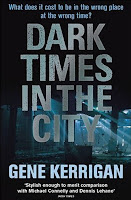
I’m only grumbling because I wasn’t invited, of course, but there’s a touch of the tired old blarney about ‘Emerald Noir’, next Saturday morning’s panel on Irish crime writing at Harrogate, which will be moderated by Ruth ‘Cuddly’ Dudley Edwards (right). Quoth
the Harrogate interweb malarkey:
Crime fiction is for many identified with big, brash urban landscapes, but some of the hottest properties in contemporary crime fiction come from and write about the greenest of all lands, Ireland. But what is it about the Emerald Isle that makes it the perfect place for crime of all types? Four top names – Declan Hughes, Gene Kerrigan, Ava McCarthy and Brian McGilloway – talk about their influences and background, the importance of landscape and history, and the place of politics and religion in their work with veteran (and often controversial) commentator on Irish life, Ruth Dudley Edwards.
Now, Ireland may be green in places, certainly, but Hughes and McCarthy both set their novels for the most part in Dublin, while it’s debatable as to whether city boy Gene Kerrigan has ever seen a real field in his entire life. Turf bogs and boreens aren’t a notable feature of Ruth Dudley Edwards’ novels, either.
I’m not sure if any of the writers involved write ‘about’ Ireland. They may set their novels here, but that’s not necessarily the same as writing about the place. The stories they write aren’t unique to their setting, and to the extent that they use current and recent Irish events for backdrop, they function as implicit criticisms of an urban existence that could apply to most cities anywhere in the world. Even Brian McGilloway, who sketches the distinctive rural hinterland of Donegal and Derry with some aplomb, is writing stories that could apply to most international borders, and particularly those borders between countries with a history of conflict.
This is a good thing, I think. I like it that these writers are of a generation confident enough to get their heads up and have a good look around, and write stories that aren’t necessarily beholden to their place. There was a time when being an ‘Irish writer’ meant writing about Ireland, which makes a certain amount of sense given that the country is a relatively young one, and still trying to establish an identity; by the same token, it smacked of the insularity of self-consciousness and maybe even an inferiority complex.
Happily, that’s no longer the case. There’s no reason why a crime novel needs to be ‘about’ its setting any more than a crime novel needs to be some kind of political statement, or social commentary.
That caveat aside, the ‘Emerald Noir’ panel looks like – no, hold up, there’s another caveat. About this time last month, when I first looked in on the Harrogate website, said ‘Emerald Noir’ entry included Ken Bruen. Erm, where’s Sir Kenneth of Bruen, folks? Was he waylaid on the way to the festival? Will there be a ransom demand any time soon? Talk to us – we can be the honest broker in this deal …
Where was I? Oh yes, Ruth Dudley Edwards, and AFTERMATH, her new book about the Omagh atrocity. Clickety-click over here for some pics of the launch party, and
a rather interesting video of Peter Mandelson trying to be humble. No kidding, it looks like Mandy’s about to turn inside-out and in the process rip a hole in the space-time continuum.
And while we’re on the subject of Harrogate et al, John Banville may or may not be in Benjamin Black mode for his conversation with Reginald Hill, scheduled for Friday evening, 8pm, but if you’re in the vicinity, I urge you to go. His new Banville novel, THE INFINITIES, is due out this autumn, and it sounds like an absolute cracker, and if my experience of interviewing him is anything to go by, he’s funny, self-deprecating and occasionally illuminating about the business of writing. Not everyone will agree with me, I know, but that’s the way the cookie crumbles …
Finally, it’s still not too late to
VOTE FOR DECLAN HUGHES for Crime Novel of the Year. You know it makes sense …
 Further to Adrian McKinty getting lumps kicked out of his latest novel, FIFTY GRAND, in the Irish Times this week, and in the interest of balance, we present a little nugget that slipped through the net from last month, in which Fintan O’Toole gits jiggy with James Joyce’s ULYSSES in – oh yes! – the Irish Times. To wit:
Further to Adrian McKinty getting lumps kicked out of his latest novel, FIFTY GRAND, in the Irish Times this week, and in the interest of balance, we present a little nugget that slipped through the net from last month, in which Fintan O’Toole gits jiggy with James Joyce’s ULYSSES in – oh yes! – the Irish Times. To wit: 










.gif)